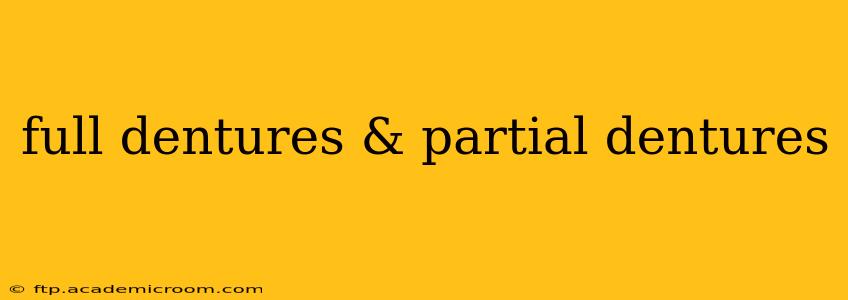Losing teeth can significantly impact your confidence, eating habits, and overall well-being. Fortunately, advancements in dentistry offer excellent solutions, primarily full and partial dentures. Understanding the differences between these two options is crucial in making an informed decision about which is best suited for your individual needs. This comprehensive guide will explore the nuances of full and partial dentures, helping you navigate this important choice.
What are Full Dentures?
Full dentures, also known as complete dentures, are prosthetic devices that replace an entire set of teeth—either on the upper arch (maxilla), the lower arch (mandible), or both. They're typically made from acrylic resin or a combination of acrylic and other materials for strength and durability. Full dentures are necessary when all natural teeth have been lost or need to be extracted.
Advantages of Full Dentures:
- Restoration of Function: Full dentures restore the ability to chew and speak more effectively than without teeth.
- Improved Appearance: They significantly improve the aesthetics of your smile, enhancing confidence and self-esteem.
- Relatively Affordable: Compared to other tooth replacement options, such as dental implants, full dentures are generally more cost-effective.
Disadvantages of Full Dentures:
- Adjustment Period: Getting used to full dentures can take time and requires patience. There might be initial discomfort, challenges with speech, and difficulty eating certain foods.
- Regular Maintenance: Full dentures require regular cleaning and maintenance to prevent bacterial growth and ensure proper fit. They also need periodic adjustments from your dentist as bone resorption occurs over time.
- Not as Secure as Natural Teeth: Full dentures can feel loose or shift, especially during eating or speaking.
What are Partial Dentures?
Partial dentures, also called removable partial dentures (RPDs), are used when some natural teeth remain in the mouth. These dentures fill in the gaps left by missing teeth, providing support and improving the appearance of your smile. They typically consist of artificial teeth attached to a framework that's designed to clasp onto your existing teeth.
Advantages of Partial Dentures:
- Preserve Natural Teeth: Partial dentures help preserve your remaining natural teeth, preventing further tooth loss.
- Improved Function & Appearance: They restore chewing ability and improve the overall aesthetics of your smile.
- Less Invasive than Implants: Compared to dental implants, partial dentures are less invasive and require a simpler procedure.
Disadvantages of Partial Dentures:
- Adjustment Period: Like full dentures, there's an adjustment period required to get accustomed to wearing partial dentures.
- Maintenance: Partial dentures need regular cleaning and maintenance to prevent bacterial buildup and ensure proper fit.
- Can Affect Remaining Teeth: If not properly maintained, partial dentures can potentially affect the health of your remaining natural teeth.
What are the Different Types of Dentures?
There are several types of dentures available, and the best choice depends on individual needs and preferences. These include:
- Conventional Dentures: These are placed in the mouth after the gums have fully healed from tooth extraction.
- Immediate Dentures: These are placed immediately after the teeth are extracted.
- Overdentures: These are placed over remaining natural teeth or dental implants.
How Long Do Dentures Last?
The lifespan of dentures varies depending on several factors, including the quality of materials, oral hygiene practices, and individual wear and tear. With proper care and regular maintenance, dentures can last for several years, but they often need relining or replacement over time due to bone resorption.
How Much Do Dentures Cost?
The cost of dentures varies depending on the type of denture, the materials used, and the location of the dental practice. It's recommended to consult with a dentist for a personalized quote.
How to Care for Dentures?
Proper denture care is crucial for maintaining oral hygiene and extending the life of your dentures. This includes regular cleaning, proper storage, and regular dental checkups.
What are the alternatives to dentures?
Besides full and partial dentures, other tooth replacement options include dental implants, bridges, and veneers. Each option has its advantages and disadvantages, and the best choice depends on individual circumstances.
This guide provides a general overview of full and partial dentures. It’s crucial to consult with a qualified dentist to determine which option is best for your unique needs and circumstances. They can perform a thorough examination, assess your oral health, and advise you on the most appropriate course of action.
